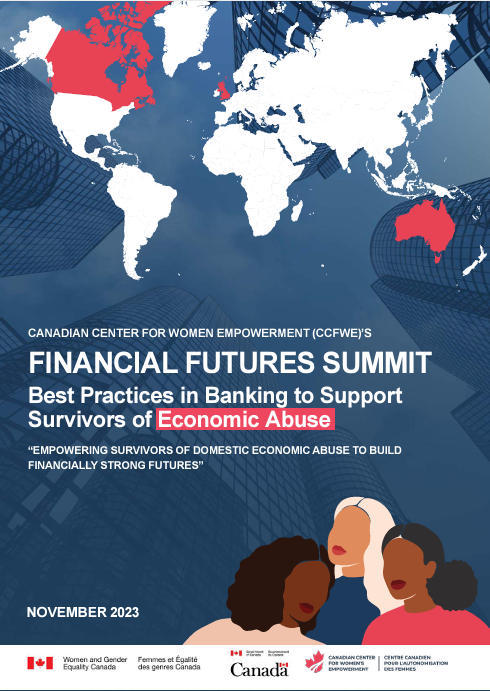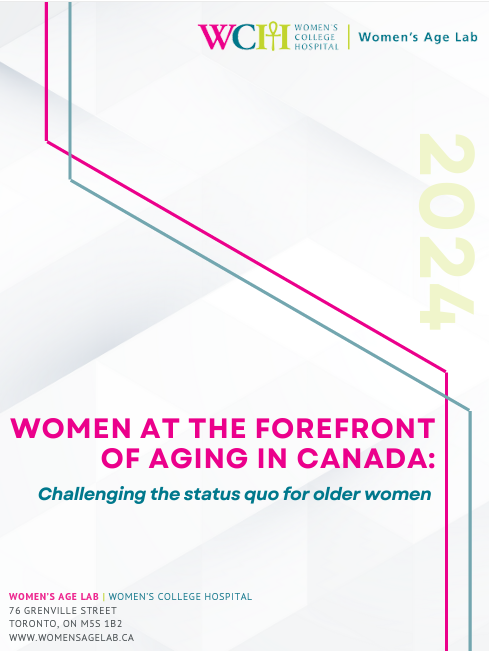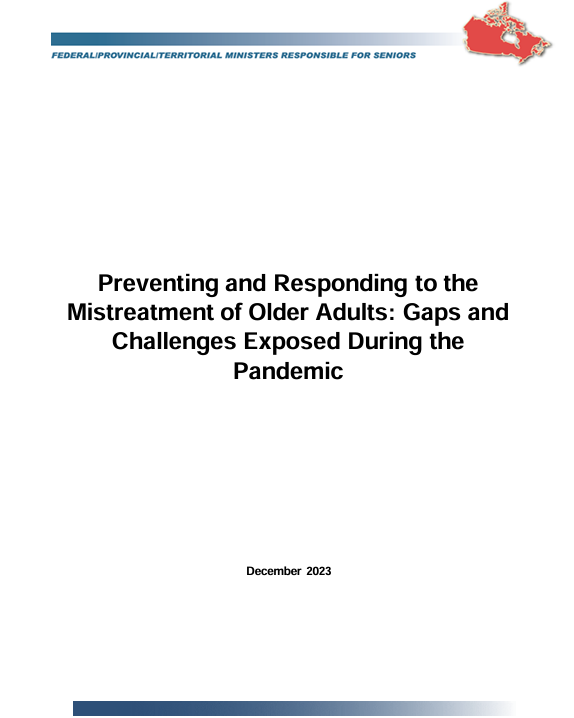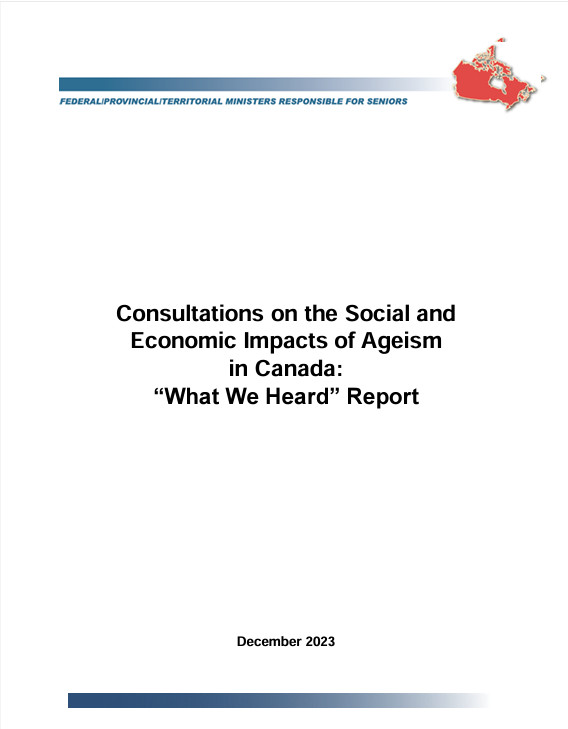 “EMPOWERING SURVIVORS OF DOMESTIC ECONOMIC ABUSE TO BUILD FINANCIALLY STRONG FUTURES”
“EMPOWERING SURVIVORS OF DOMESTIC ECONOMIC ABUSE TO BUILD FINANCIALLY STRONG FUTURES”
On November 16th, 2023, the Canadian Center for Women’s Empowerment (CCFWE) hosted the Financial Futures Summit to highlight industry best practices for establishing trauma informed, equitable, and inclusive financial systems. The virtual event brought together more than 80 participants from across Canada and worldwide, including representatives from financial institutions, credit unions, policy makers, frontline staff, experts by experience, and advocacy organizations from the UK, Australia, and Canada. (...) This report consolidates key discussion points from the event, highlights best practices, and transforms insights and findings from the Summit discussions into actionable steps for the future.
 "Empowering older women requires a colective and concerted effort from researchers, healthcare providers, community organizations and government. Canada is witnessing a major demographic shift within its aging population, particularly among women. Despite their growing numbers, older women often face unique health chalenges that are overlooked in research, healthcare, and policymaking. Building on Women’s Age Lab’s research and notable initiatives in Canada, this report highlights the health and well-being chalenges that older women face daily and on a systemic level. It aims to shed light on these issues, propose solutions, and cal for action to improve the quality of life for older women."
"Empowering older women requires a colective and concerted effort from researchers, healthcare providers, community organizations and government. Canada is witnessing a major demographic shift within its aging population, particularly among women. Despite their growing numbers, older women often face unique health chalenges that are overlooked in research, healthcare, and policymaking. Building on Women’s Age Lab’s research and notable initiatives in Canada, this report highlights the health and well-being chalenges that older women face daily and on a systemic level. It aims to shed light on these issues, propose solutions, and cal for action to improve the quality of life for older women."
Source: Women’s Age Lab’s
- David Burnes, PhD, Canada Research Chair in Older Adult Mistreatment Prevention; Associate Professor, University of Toronto, Factor-Inwentash Faculty of Social Work; Affiliate Scientist, Baycrest, Rotman Research Institute; and
- Professeure Marie Beaulieu, Ph.D., MSRC/FRSC; Co-Director, WHO Collaborative Centre, Age Friendly Communities/Elder Abuse; Retired Professor and Associate, Université de Sherbrooke, School of Social Work; Associate Researcher, Research Centre on Aging, CIUSSS Estrie-CHUS;
for the Federal, Provincial and Territorial (FPT) Forum of Ministers Responsible for Seniors.
The objective of this project was to identify gaps and challenges in preventing and responding to MOA in Canada, more specifically, gaps and challenges that were exposed or exacerbated during the pandemic. This project undertook the following 2 strategies to meet this objective:
- a comprehensive review of the literature focusing on MOA prevention and response during the pandemic
- a survey of stakeholders across Canada directly involved in MOA prevention or response throughout the pandemic
Based on the findings synthesized across the comprehensive literature review and stakeholder survey, a set of recommended future directions are provided. These future direction recommendations represent key opportunities and actionable steps to address the identified gaps and challenges in preventing and responding to MOA that were exposed during the pandemic.
Source: Employment and Social Development Canada
Prepared by Laura Kadowaki, Barbara McMillan, and Kahir Lalji (United Way British Columbia) for the Federal, Provincial and Territorial (FPT) Forum of Ministers Responsible for Seniors.
As a part of the FPT Seniors Forum’s work, feedback was sought from Canadians to better understand the impacts of ageism at the individual level, and at the community level. Between September and November 2022 a total of 8 FPT Seniors Forum-led roundtable consultations and 17 stakeholder-led consultations were hosted across Canada, providing participants with an opportunity to discuss ageism. This “What We Heard” report summarizes input received from the FPT Seniors Forum led roundtable consultations and stakeholder-led consultations and the ageism questionnaire. This input will inform a subsequent Policy Options Report, to be submitted to FPT Ministers for their consideration, that will propose approaches, initiatives, and strategies to address ageism in Canada.
In the ageism questionnaire, respondents were asked whether they had ever experienced ageism themselves. Approximately half (48.4%) of respondents responded yes. The most common settings in which respondents reported having experienced or seen ageism were public settings, workplace settings, and health care settings. Furthermore, over two-thirds of questionnaire respondents (69.9%) believed that ageism has increased in Canada since the COVID-19 pandemic began.
Themes explored in the consultations:
- employment
- health and health care
- social inclusion
- safety and security
- media and social media
Source: Employment and Social Development Canada
 This report collected and analyzed recommendations made in published reports on prevention of abuse of older adults in Canada. Abuse of older adults is perpetuated by systemic drivers like ageism. The varied networks, community response organizations, provincial and territorial strategies and legislative changes devoted to the topic reflect ongoing concerns about it among policymakers across Canada.
This report collected and analyzed recommendations made in published reports on prevention of abuse of older adults in Canada. Abuse of older adults is perpetuated by systemic drivers like ageism. The varied networks, community response organizations, provincial and territorial strategies and legislative changes devoted to the topic reflect ongoing concerns about it among policymakers across Canada.
Actions to date have not been sufficient or applied consistently enough to tackle the issue across the country, however, and within the existing system there remain many opportunities for change. Through analysis of many recommendations made in published reports, and engagement with participating Elder Abuse Task Force members, AGEWELL- APPTA developed 5 overarching goals for Canada’s approach to addressing the abuse of older adults:
(1) Funding models for prevention and response to abuse that are budget line items for appropriate ministries, rather than special initiatives;
(2) Establishing seniors advocate offices in the federal government, and in provinces and territories where they are not already present;
(3) Amendments to legislation to protect all older adults;
(4) Improved data collection; and
(5) Improved awareness and education, including combating ageism in society
Elder Abuse Task Force members
- Canadian Network for Prevention of Elder Abuse (CNPEA),
- BC Association of Community Response Networks (BC CRN)
- Isobel MacKenzie, Seniors Advocate, BC
- Alberta Elder Abuse Awareness Council (AEAAC)
- Seniors NL
- CanAGE
- British Columbia Law Institute (BCLI)
- Elder Abuse Prevention Ontario (EAPO)
- Caregiving Matters
- New Brunswick Seniors’ Advocate office
Page 1 of 20



















